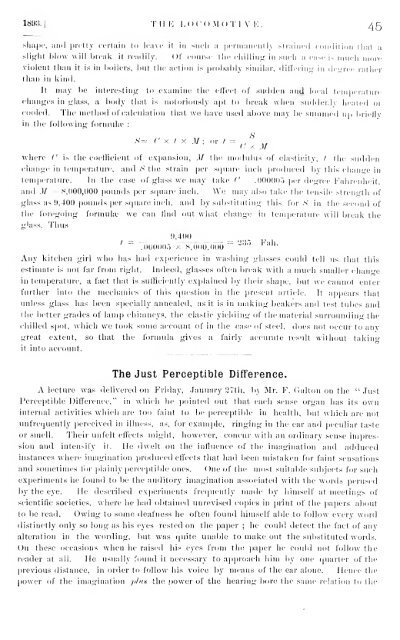The Locomotive - Lighthouse Survival Blog
The Locomotive - Lighthouse Survival Blog
The Locomotive - Lighthouse Survival Blog
You also want an ePaper? Increase the reach of your titles
YUMPU automatically turns print PDFs into web optimized ePapers that Google loves.
1893.J THE LOCOMOTIVE. 45<br />
slmpc, and jji-itty rcrtuiii to leave it in siuli a |)criiiaiiciitly strained condition that a<br />
sliglit blow will break it readily. Of coiiise the ehillinj,' in such a easc! is much more<br />
violent than it is in boilers, but the action is probably similar, diirering in degree ratlier<br />
than in kind.<br />
It may be interesting to examine tlic eilect of sudden and local t(Mnperaturc<br />
changes in glass, a body that is notoriously apt to l)reak when suddenly lieated or<br />
cooled. Tlie method of calculation that wc have used above may be summed nj) briefly<br />
in the following forinulic :<br />
o<br />
S— C X f X Af: or t =-^ TV<br />
C X M<br />
where C is the coetticicnt of expansion, M the modulus of elasticity, t the sudden<br />
change in temperature, and jS the strain per square inch produced by this cliano-e in<br />
temperature. In the case of glass we may take C .00000.7 per degree Fahrenlieit,<br />
and M — 8,000,000 pounds per square inch. We may also take the tensile strengtli of<br />
glass as !i, 400 pounds per square inch, and by substituting this for N in the second of<br />
the foregoing formukc we can find out what change in temperature will break the<br />
glass. Thus<br />
* ~ TOUOOOo X 8,000,000 "" ^^^'* *'''^'<br />
Any kitchen girl who has had experience in washing glasses could tell us that this<br />
estimate is not far from right. Indeed, glas.ses often break with a much smaller change<br />
in temperature, a fact that is sufficiently explained by their shape, but we cannot enter<br />
further into the mechanics of "this question in the present article. It appears that<br />
imless glass has been specially annealed, as it is in making beakers and test tubes and<br />
the better grades of lamp chimneys, the elastic yielding of the material surrounding the<br />
chilled spot, which we took some account of in the case of steel, does not occur to any<br />
great extent, so that the tbnnula gives a fairly accurate result without taking<br />
it into account.<br />
<strong>The</strong> Just Perceptible Difference.<br />
A lecture was delivered on Friday, January 27th, by Mr. F. Galton on the " Just<br />
Perceptible Difference," in which he pointed out that each sense organ has its own<br />
internal activities which are too faint to be perceptil)le in health, but which are not<br />
unfrequently perceived in illness, as, for example, ringing in the ear and ])eculiar taste<br />
or smell. <strong>The</strong>ir unfelt effects might, however, concur with an ordinary sense impression<br />
and intensify it. He dwelt on the influence of the imagination and adduced<br />
instances where imagination produced effects that had been mistaken for faint sensations<br />
and sometimes for plainly perce])tible ones. One of the most suitable sul)jects for such<br />
experiments he found to be the auditory imagination associated with the words perused<br />
by the eye. He described experiments frequently made by himself at meetings of<br />
scientific societies, where he had obtained unrevised copies in print of the papers about<br />
to be read. Owing to some deafness he often found himself able to follow every word<br />
distinctly only so long as his eyes rested on the paper ; he could detect the fact of any<br />
alteration in the Avording, but was quite unable to make out the substituted words.<br />
On these occasions when he raised his eyes from the ])a|)er he could not follow the<br />
reader at all. He usually found it necessary to approach him by one quarter of the<br />
previous distance, in order to follow his voice by means of the ear alone. Hence the<br />
power of the imagination plan the power of the hearing bore the same relation to the
















